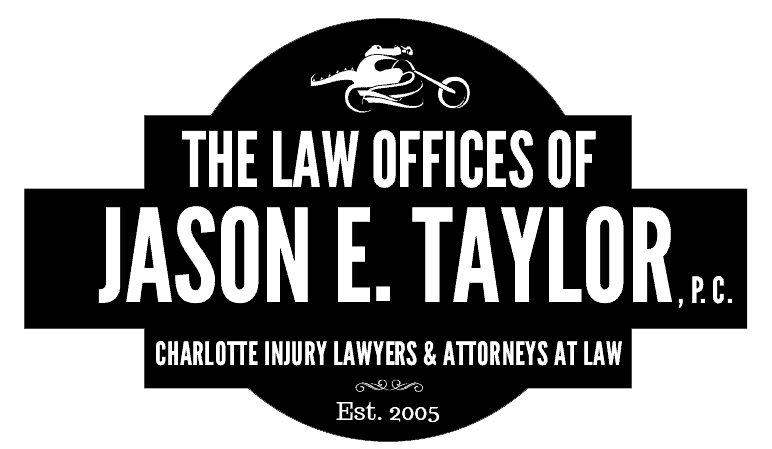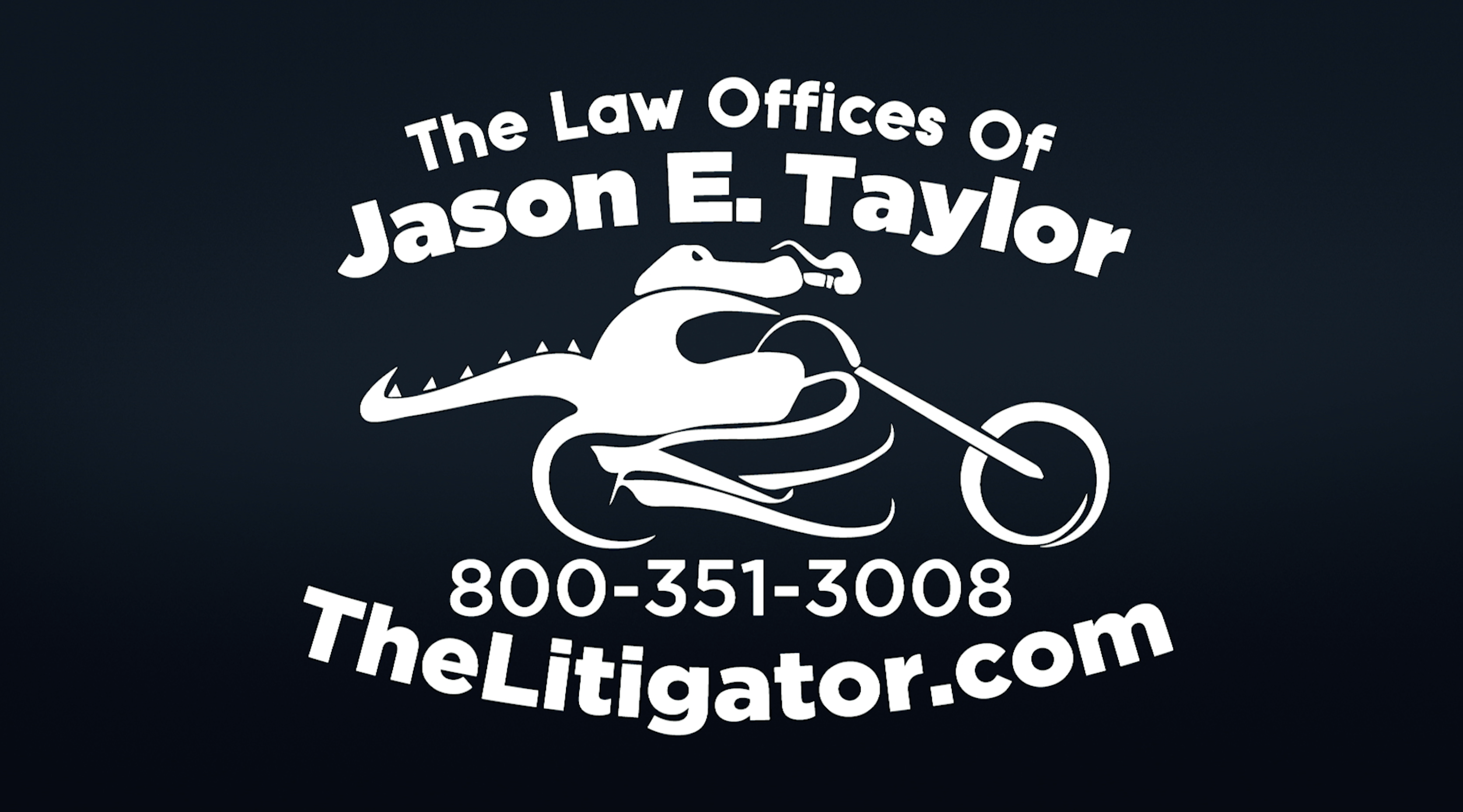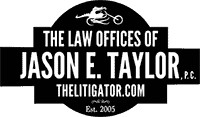Acaba de sufrir un accidente automovilístico y no está seguro de qué hacer. ¿Deberías ir al médico? ¿Qué tipo de lesiones podría tener? ¿Qué debes hacer con tu coche?
Si usted o un ser querido ha estado involucrado en un accidente automovilístico, comuníquese con las Oficinas Legales de Jason E. Taylor. Nuestros abogados con experiencia en accidentes automovilísticos en Charlotte están aquí para ayudarlo. Ofrecemos consultas gratuitas, así que llámenos hoy para programar una consulta.
¿Qué debo hacer si he tenido un accidente automovilístico en Charlotte, Carolina del Norte?
Si ha estado en un accidente automovilístico, primero debe buscar atención médica si resulta herido. Una vez que un médico lo haya atendido, debe comunicarse con un abogado con experiencia en accidentes automovilísticos para analizar sus opciones legales. Un abogado experimentado puede ayudarle a navegar por las reclamaciones de seguros y proteger sus derechos.
Si usted o un ser querido ha estado involucrado en un accidente automovilístico, comuníquese con las Oficinas Legales de Jason E. Taylor. Nuestros abogados con experiencia en accidentes automovilísticos están aquí para ayudarlo. Ofrecemos consultas gratuitas, así que llámenos hoy para programar una consulta.
La importancia de buscar atención médica después de un accidente automovilístico
Debe buscar atención médica después de un accidente automovilístico por varias razones.
Algunas lesiones no aparecen de inmediato
Una razón es que algunas lesiones, como el latigazo cervical, pueden no aparecer de inmediato. Es importante acudir a un médico para que pueda detectar cualquier lesión a tiempo y recibir el tratamiento que necesita.
Es posible que necesite documentación para un reclamo o demanda de seguro
Si planea presentar un reclamo de seguro o una demanda, necesitará pruebas de sus lesiones. Ir al médico crea un rastro documental y garantiza que no haya dudas sobre el alcance de sus lesiones y ayuda a establecer que fueron causadas por el accidente.
Obtenga el tratamiento que necesita
La razón más importante para buscar atención médica inmediata después de un accidente automovilístico es asegurarse de recibir el tratamiento que necesita para recuperarse de sus lesiones. Algunas lesiones ponen en peligro la vida y requieren tratamiento inmediato. Por ejemplo, el daño podría ser permanente si sufre una lesión cerebral traumática y espera demasiado para recibir tratamiento.
Algunas lesiones no son tan graves, pero pueden provocar complicaciones a largo plazo si no se tratan. Por ejemplo, si se fracturó el brazo en el accidente, eventualmente sanará por sí solo. Sin embargo, si no se trata correctamente, se podría tener una deformidad o perder alguna función.
¿Qué tipos de lesiones debo buscar después de un accidente automovilístico?
Algunas lesiones comunes en accidentes automovilísticos incluyen latigazo cervical, dolor de cuello y espalda, dolores de cabeza, cortes y hematomas, huesos rotos y conmoción cerebral. Si siente dolor o malestar después de un accidente automovilístico, es importante consultar a un médico lo antes posible.
¿A dónde debo acudir para recibir tratamiento médico después de un accidente?
El lugar al que debe acudir para recibir tratamiento médico depende de la gravedad de sus lesiones. Si tiene lesiones graves que requieren tratamiento médico inmediato, es probable que una ambulancia lo lleve a la sala de emergencias. Si sus lesiones no ponen en peligro su vida, puede consultar a su médico de atención primaria o a un profesional médico en un centro de atención de urgencia.
En algunos casos, es posible que necesite consultar a un médico especialista, como un neurólogo, ortopedista o quiropráctico. Su médico de atención primaria puede derivarlo a un especialista si es necesario.
Guarde todas sus facturas y registros médicos independientemente de dónde vaya para recibir tratamiento médico. Estos serán importantes si presenta un reclamo o demanda de seguro.
¿Qué sucede después de recibir atención médica?
Después de recibir atención médica, es probable que tenga una cita de seguimiento con su médico para evaluar sus lesiones y determinar los próximos pasos de su tratamiento.
Es posible que necesite fisioterapia
Su médico puede recomendarle fisioterapia si ha sufrido lesiones específicas, como un latigazo cervical o una conmoción cerebral. La fisioterapia puede ayudar a acelerar su recuperación y reducir el dolor.
Siga el plan de tratamiento de su médico
También debe asegurarse de seguir el plan de tratamiento del médico. Esto le ayudará a recuperarse de sus lesiones y evitará mayores complicaciones.
¿Quién paga mis facturas médicas?
Si resultó lesionado en un accidente automovilístico que no fue su culpa, tiene algunas opciones diferentes para pagar sus facturas médicas.
Cobertura de pagos médicos
Si tiene cobertura de pagos médicos como parte de su póliza de seguro de automóvil, esto le ayudará a cubrir sus gastos médicos después de un accidente, hasta el límite de su póliza. La cobertura de pagos médicos llena la brecha entre su seguro médico y el costo de su tratamiento médico y puede ayudarlo a reembolsar los gastos de bolsillo como copagos y deducibles.
Seguro de salud
Es probable que su seguro médico cubra la mayor parte, no la totalidad, del costo de su tratamiento médico después de un accidente. Sin embargo, es posible que deba pagar un deducible antes de que entre en vigencia la cobertura de su seguro, que es un área en la que la cobertura de pagos médicos puede ser útil.
Reclamación por lesiones personales contra la compañía de seguros del conductor culpable
Si planea presentar un reclamo por lesiones personales, la compañía de seguros del conductor culpable debe pagar sus gastos médicos si tiene cobertura de responsabilidad por lesiones corporales. Sin embargo, no lo harán hasta que se resuelva su caso. Esto puede llevar meses o incluso años.
¿Qué debo hacer si no puedo costear el tratamiento médico después de un accidente?
Si no tiene seguro médico o no puede pagar el tratamiento médico, todavía hay opciones disponibles. Por ejemplo, muchos hospitales ofrecen programas de asistencia financiera para quienes no pueden pagar sus facturas médicas.
También puede comunicarse con un abogado de lesiones personales que pueda ayudarlo a obtener el tratamiento que necesita mediante la creación de una carta de protección o la negociación con su compañía de seguro médico.
Una carta de protección es un documento enviado por su abogado a un proveedor médico aceptando pagar los gastos médicos adeudados de cualquier recuperación futura, ya sea mediante acuerdo o juicio y sentencia. Este acuerdo contractual permite a las personas lesionadas obtener la atención que necesitan a crédito, y el proveedor médico acepta esperar hasta la conclusión del caso para exigir el pago.
Si su caso se resuelve o se llega a un veredicto, su abogado se asegurará de que las facturas se paguen con los fondos del acuerdo. Sin embargo, es importante recordar que una carta de protección no significa que no tendrá que pagar sus gastos médicos. Si no hay recuperación o la recuperación es insuficiente, entonces usted es responsable de la factura y el proveedor médico tiene derecho a reclamar la factura completa. Esta es una de las razones por las que es importante tener cobertura contra conductores con seguro insuficiente.

Póngase en contacto con un abogado de accidentes automovilísticos de Charlotte hoy
Si resultó lesionado en un accidente automovilístico, no espere para obtener la ayuda legal que necesita. Los abogados expertos en accidentes automovilísticos de las Oficinas Legales de Jason E. Taylor pueden ayudarlo a obtener la compensación que se merece.Tenemos experiencia en el manejo de varios casos de accidentes automovilísticos, valoramos la relación abogado-cliente y brindamos a cada cliente la atención individualizada que merece. Póngase en contacto con nosotros hoy para una consulta gratuita. Atendemos a clientes en Charlotte y sus alrededores.








